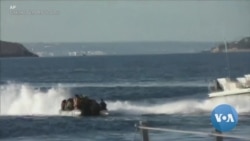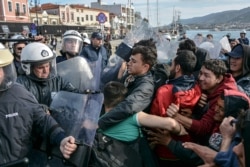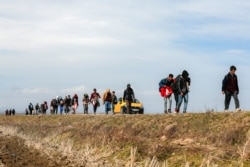The European Union has pledged over $780 million to help Greece cope with a surge in the number of migrants trying to cross into the country from Turkey, as the bloc fears a repeat of the 2015 refugee crisis.
Greece has closed down the land border and ramped up security around islands in the Aegean Sea close to Turkey. Athens and the EU say Ankara is fully to blame for the crisis, as tens of thousands of migrants remain camped out along the border.
Turkish authorities released video Tuesday appearing to show Greek security forces firing into the water close to a migrant boat off Lesbos Island.
Meanwhile, Greece released its own video purporting to show a Turkish government patrol boat apparently helping a dinghy full of migrants cross towards Lesbos island.
Greece is deploying soldiers and military hardware along the frontier. Athens received a show of solidarity Tuesday as the presidents of the European Union Commission, Council and Parliament joined the Greek prime minister on a visit to the land border.
“This border is not only a Greek border, but it is also a European border,” European Commission President Ursula von der Leyen told reporters after the visit. “And I stand here today as a European at your side. I also want to express my compassion for the migrants that have been lured through false promises into this desperate situation. We have come here today to send a very clear statement of European solidarity and support to Greece.”
Thousands of migrants descended on Turkey’s western border beginning last Friday, after Turkish President Recep Tayyip Erdogan encouraged them to head for Europe.
“The EU needs to keep its word, has to keep its promises,” Erdogan said at the weekend. “We are not obliged to look after and feed so many refugees. If you're honest, if you're sincere, then you need to share (the burden). We are hosting 3.7 million Syrians in our country. We are in not in a position to endure a new wave of migration. … The number of people going to the border will soon be expressed in millions,” he warned.
Turkey has accused the EU of failing to offer support following the intense fighting in Syria’s Idlib province, which has forced hundreds of thousands of people to flee their homes. Dozens of Turkish soldiers have been killed in the fighting between Russian-backed Syrian government forces and Turkish-back rebels in recent weeks.
The majority of migrants heading for Greece appear to be Afghans, alongside people from Iran, Iraq, Syria and elsewhere. Greek Prime Minister Kyriakos Mitsotakis accused Ankara of blackmail Tuesday.
“The tens of thousands of people who tried to enter Greece for the past few days did not come from Idlib, they have been living safely in Turkey for a long period of time. Europe will not be blackmailed by Turkey over the refugee issue,” Mitsotakis said. “What has happened here over the past days is painfully obvious to everyone. Turkey, in full breach of the EU-Turkey statement, has systematically encouraged and assisted tens of thousands of refugees and migrants to illegally enter Greece. … This is a blatant attempt by Turkey to use desperate people to promote its geopolitical agenda and to divert attention from the horrible situation in Syria.”
Many migrants are attempting to cross the Evros river that runs along part of the frontier. Afghan migrant Sinan Yilmaz is among thousands of asylum-seekers camping along the Turkish side of the border.
“Friends of ours came through last night, but they took everything, their money, their shoes, and sent them back here. That's why we don't consider it, unless the doors open, God willing,” Yilmaz said.
Human rights groups have criticized Europe’s response.
“Solidarity is absolutely the key, but the kind of solidarity needs to be sharing responsibility for hosting and processing asylum-seekers rather than solidarity which is about keeping people away from Europe,” Ben Ward of Human Rights Watch told VOA. He also criticized Turkey’s recent actions. “Asylum-seekers are people, with families, with loved ones, with hopes and dreams. And they ought to be treated with dignity and respect. And obviously treating them like pawns is never acceptable.”
Among Greeks attitudes appear to have hardened. On Lesbos island local residents tried to prevent a migrant boat from coming ashore Sunday. Greece and Europe are counting on public support for the hard-line stance and put the blame squarely on Turkey.
Caught in the middle are tens of thousands of desperate migrants, the pawns in a game of diplomatic brinkmanship.







